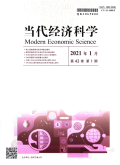当代经济科学2024,Vol.46Issue(2):30-44,15.DOI:10.20069/j.cnki.DJKX.202402003
育龄收入、子女人力资本与代际经济支持
Income of Child-bearing Age,Children's Human Capital and Economic Support
摘要
Abstract
Summary China is currently undergoing a transition in its population structure,known as the"quantity-quality"transformation,referring to the shift from a"quantity-based"demographic dividend to a"quality-based"human capital dividend.This trend offers a new perspective on understanding the economic support provided by families in elderly care.Families can be seen as the smallest pay-as-you-go informal pension units.While a decrease in the number of children might reduce economic support,if the quality of children improves sufficiently to offset this decline,i.e.,when the conversion rate from quantity to quality is sufficiently high,the economic support capability of children does not diminish.This raises three questions:First,can the condition of a"sufficiently high"conversion rate from quantity to quality be met?Second,what factors influence the satisfaction of this condition?Third,how can the economic support capability of children be enhanced in light of the difficult-to-reverse trend of declining birth rates?This paper aims to address these questions. This study utilizes panel data from the China Family Panel Studies(CFPS)covering the period from 2010 to 2018.By employing the fixed-effect method for estimating lifetime income,the study assesses individuals'income during their childbearing years.Additionally,instrumental variable and two-stage least squares methods are utilized to mitigate endogeneity.The study characterizes the conversion rate from quantity to quality within families by verifying the existence of the"quantity-quality trade-off"effect of children.Moreover,mediation effect models are employed to investigate the impact of income during the childbearing years on economic support under the mechanism of the"quantity-quality trade-off"of children.Finally,heterogeneity analysis is conducted concerning variations in the severity of declining birth rates,urban-rural disparities,and differences in participation in old-age insurance. The research findings uncover a significant"quantity-quality trade-off"effect among children within families.A higher conversion rate from quantity to quality of children,both in total and average measures,corresponds to a more pronounced improvement in economic support.This suggests that despite a reduced number of children,enhancing their quality can partially offset the economic resources of elderly parents.Furthermore,increasing parents'income during their childbearing years benefits the conversion from quantity to quality of children,thereby augmenting economic support.Heterogeneity analysis indicates that in families experiencing more severe declining birth rates,the conversion from quantity to quality can narrow the gap in children's human capital and alleviate the disparity in family resources for elderly care.In families where parents do not participate in old-age insurance,the"quantity-quality trade-off"mechanism of children plays a more significant role in increasing economic support.However,in rural families,the effect of the"quantity-quality trade-off"mechanism on increasing economic support has not yet materialized.Given the current challenges of rural aging,declining birth rates,and the relative inadequacy of public pension security,this trend may impede the enhancement of rural family support capabilities. The findings of this paper offer a new micro-level perspective on understanding the impact of the"quantity-quality"transformation in population structure on elderly care in China.They also provide insights for optimizing family support policies for the elderly:actively promoting the conversion from quantity to quality of children seems to be a feasible approach.关键词
人口结构转型/育龄收入/家庭养老/子女人力资本/子女"数量—质量替代"/代际经济支持Key words
demographic transition/income of child-bearing age/family support for the elderly/human capital of children/quantity-quality trade-off of children/intergenerational economic support引用本文复制引用
李聪,毕皓林,刘李华,王岚..育龄收入、子女人力资本与代际经济支持[J].当代经济科学,2024,46(2):30-44,15.基金项目
国家自然科学基金优秀青年科学基金项目"生态脆弱地区可持续发展政策评估与管理"(72022014) (72022014)
国家自然科学基金项目"生计恢复力视角下易地扶贫搬迁对象脱贫模式、返贫风险与可持续发展政策创新研究"(71973104) (71973104)
国家社会科学基金一般项目"数字化转型过程中收入不平等的形成机理及其经济增长效应研究"(23BJL139). (23BJL139)

